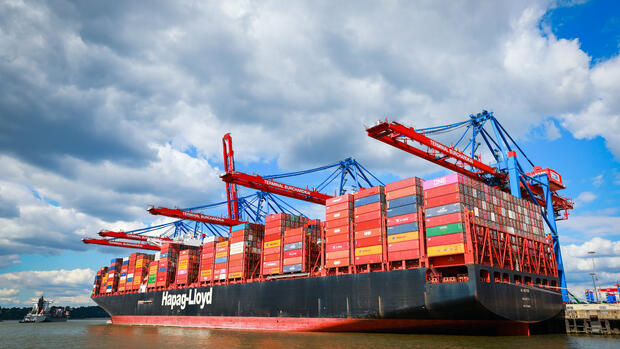As late as 2022, the high freight rates caused a lot of price increases.
(Photo: dpa)
Dusseldorf US President Joe Bilden complained last year that at least one percentage point of global inflation was at the expense of logistics providers. After the outbreak of Corona, they initially massively reduced their capacities, only to realize just a few months later that this was leading to considerable bottlenecks in the movement of goods.
They benefited princely from the chaos caused by the lack of containers and handling backlogs in the ports. Although an estimated four percent less was transported by sea in 2022 than in the previous year, the management of shortages quintupled global freight rates. Shipping companies, air freight companies and freight forwarders made record profits at the expense of industry and consumers, who were quickly passed on the price increases in logistics.
But the party will be over by autumn 2022 at the latest. Freight rates have been in free fall again as galloping inflation cools consumer markets and the congestion in ports unwinds. With unpleasant side effects for many logistics companies: the former drivers of inflation are now becoming its victims.
Not only shipping companies such as Hapag-Lloyd and logistics groups such as Deutsche Post DHL have warned of drastically shrinking profits in recent weeks because transport and personnel costs are getting out of hand due to inflation. The warehousing business, which many transport companies also offer their customers, is also suffering from a significant drop in earnings.
Price increases can hardly be passed on
A survey by the network provider Warehousing 1 found in a survey of more than 100 warehouse logisticians at the end of March: Almost half of them (47.5 percent) said they were worried about their own business because of inflation. Almost every one of them is now complaining about the sharp rise in prices for electricity, heating oil and natural gas, but also for cardboard boxes and other packaging. The diesel costs for the vehicle fleet are an issue in 71 percent of the companies. The depressing thing about it: According to their own statements, only 23.8 percent of the companies were able to pass on the price increases to their customers.
Things are hardly better in the so-called system logistics, which takes care of the transport of general cargo. According to the Bundesverband Spedition und Logistik (DSLV), the costs there in the second half of 2022 were an impressive 15.5 percent higher than in the same period of the previous year. In particular, rising wages catapulted personnel expenses there by 16.3 percent, reports the association. Fuel costs have also gone up by 39.6 percent.
“Further wage demands, increasing truck toll rates as well as new investments and conversion costs for CO2-free logistics will continue to have a massive impact on the costs of the groupage business in the future,” expects DSLV General Manager Frank Huster. Most of these burdens on earnings are likely to affect all other transport providers.
More: Hapag-Lloyd expects slump in profits – dividend will be almost doubled.
